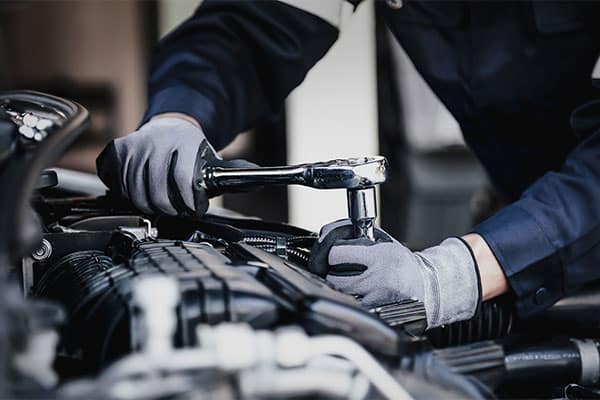All Categories
Featured
[/image]

When it comes to automobile maintenance, the brakes are probably the most important system for ensuring your safety. Normal brake inspections are vital to keeping your braking system in top condition.
- Why Brake Examinations Are Important. Brakes are designed to wear down with time, but without normal examinations, you may not discover when they come to be less reliable. A malfunctioning brake system can lead to significant accidents, enhanced repair service prices, and also the demand to replace other car elements.
Brake assessments not only aid you capture potential issues prior to they rise, however they also enable better braking performance, boosted car lifespan, and enhanced security.
- Recognizing Indication for Brake Problems. While routine assessments are necessary, you don't have to wait till your auto's following see to the mechanic. Expect these warning indicators that might indicate it's time for an assessment:
Uncommon Sounds: A shrill squeal or grinding noise when using the brakes often indicates that the brake pads are put on down or damaged. Soft or Mushy Brake Pedal: If the brake pedal really feels soft or spongy when pressed, there may be air or dampness in the brake lines, or the brake liquid might be reduced. Drawing to One Side: If the lorry pulls to one side while stopping, it might indicate unequal brake pad wear or a hydraulic problem in the brake system. Vibration in the Wheel or Pedal: If you experience resonance or pulsation when stopping, it might suggest warped blades or irregular brake pad wear. Increased Stopping Range: If it takes longer than common to bring your auto to a quit, it may be time to check the brake pads, liquid levels, or blades. If you discover any one of these indications, it's ideal to have your brakes checked instantly by an expert.
- Secret Components Checked During a Brake Inspection. During a brake inspection, a qualified technician will certainly examine several vital elements of the brake system to guarantee they're operating properly. Some of one of the most integral parts to check include:
Brake Pads: These are the rubbing material that presses versus the brake blades to decrease the vehicle. Over time, the brake pads wear down and need changing. Brake Rotors: Rotors are the steel discs that the brake pads clamp down on. They ought to be smooth and without deep grooves or fractures. Brake Fluid: The brake liquid moves the pressure from the pedal to the brakes. Low liquid levels or old, infected liquid can result in inadequate braking efficiency. Brake Lines: Brake lines bring liquid from the master cylinder to the brake parts. They ought to be looked for leaks, splits, or damages. Brake Calipers: These clamp the brake pads onto the blades. They must be in excellent functioning order and devoid of leakages. On a regular basis inspecting these components ensures your stopping system operates smoothly and aids you avoid dangerous driving scenarios.
- How Typically Should You Get Your Brakes Checked? The frequency of brake inspections depends upon your driving habits and the sort of vehicle you own. As a basic standard, it's advised to examine your brakes at the very least once a year or every 12,000 miles. If you drive in heavy traffic, regularly carry hefty tons, or drive on sloping terrain, even more regular evaluations may be essential.
It's also a good concept to have your brakes examined if you notice any one of the indication pointed out earlier, as this can prevent extra significant concerns.
- The Cost of Disregarding Brake Inspections. Overlooking normal brake examinations can cause significant consequences. Worn brake pads, damaged rotors, or low brake fluid can trigger your braking system to stop working when you need it most. Along with the security risks, disregarding brake maintenance can bring about pricey repair services later on.
For circumstances, if the brake pads are not replaced in time, the damages could reach the blades, resulting in the requirement for blades replacement-- a costly repair. By organizing routine brake evaluations, you can stay clear of these pricey repair work and keep your stopping system in good condition for longer.

- What Occurs During a Brake Examination? An expert technician will execute an in-depth evaluation of your automobile's braking system, consisting of inspecting for the adhering to:
Brake Pad Density: Brake pads require to be changed when they have put on down to a certain density. Rotor Condition: The auto mechanic will check the rotors for indicators of wear, bending, or racking up. Brake Liquid Level: Low brake liquid can impact stopping performance. The auto mechanic will check the fluid level and restore it if required. Brake Line Integrity: The brake lines will be examined for any leakages or splits that might compromise the brake system. When the assessment is total, the mechanic will certainly educate you of any needed repairs or substitutes.
Conclusion: Stay Safe with Regular Brake Inspections. Your brakes are important to keeping you and your guests secure on the road, so normal brake inspections ought to never be ignored. By taking note of indication, scheduling routine brake checks, and dealing with issues immediately, you can make certain that your brakes are always in top form.
Do not wait until your brakes stop working-- stay proactive regarding brake upkeep. A little investment in brake inspections today can save you from pricey repair work and hazardous scenarios in the future.
Latest Posts
Unlock Your Dream Fence with Flexible Financing Options
A Trip Via Time at the Deauville Inn
Discovering the Advantages of WyHy Share Interest-bearing Account
[1].jpg)